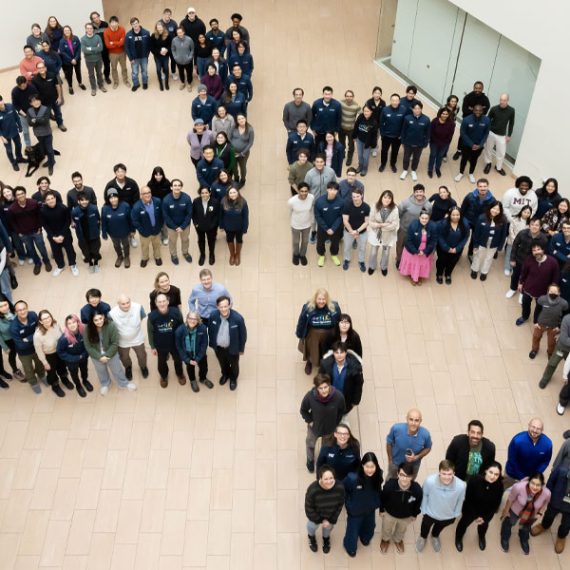McGovern Institute awards prize to vision scientist Charles Gilbert

The McGovern Institute for Brain Research at MIT announced today that Charles D. Gilbert of The Rockefeller University is the winner of the 2015 Edward M. Scolnick Prize in Neuroscience. The Prize is awarded annually by the McGovern Institute to recognize outstanding advances in any field of neuroscience.
“Charles Gilbert has been a pioneer in understanding the function of visual cortex,” says Robert Desimone, director of the McGovern Institute and chair of the selection committee. “His work addresses fundamental questions about visual perception, and has also provided important insights into how the brain recovers from injury and degenerative disease.”
Gilbert is currently the Arthur and Janet Ross Professor and head of the laboratory of neurobiology at The Rockefeller University. He received his MD and PhD from Harvard University, where he later became an assistant professor before joining the Rockefeller faculty in 1983. He was elected to the American Academy of Arts and Sciences in 2001 and to the National Academy of Sciences in 2006.
While at Harvard, Gilbert began a longstanding collaboration with Torsten Wiesel, who shared the 1981 Nobel Prize for his work with David Hubel on the function of the visual cortex. Together with Wiesel, Gilbert described the lateral neuronal connections within the cortex, which are central to our current understanding of cortical function. The primary visual cortex contains a topographic map of the visual field that is transmitted from the retina, with each neuron responding to stimuli at a particular location in visual space, known as its receptive field. But as Gilbert’s work revealed, the cortex also contains an extensive network of lateral connections that allow neurons to respond not just to the stimuli in their primary receptive fields, but also to contextual information from other parts of the image. This is central to our ability to perceive large-scale features within the clutter of natural visual scenes.
Gilbert went on on to discover that these horizontal connections play an important role in the brain’s plasticity. If a blind patch is created on retina, the corresponding patch of cortex is initially unresponsive, but soon begins to respond to stimuli delivered to the surrounding part of the visual field, causing us to be unaware of any perceptual gap. Gilbert discovered the mechanism underlying this form of plasticity, demonstrating the anatomical growth of horizontal connections within the previously inactive patch of cortex and describing the intricate changes in connectivity that follow. These studies focused on the visual cortex, but similar circuits and mechanisms are thought to exist throughout the brain, and to underlie its ability to recover after damage or disease.
The plasticity of these horizontal connections is important not only for recovery after injury, but also for perceptual learning, a form of brain plasticity that persists throughout life. It has long been recognized that visual perceptual abilities (for example, the ability to do perceptual grouping of scene components) can improve with practice, and Gilbert has studied the neural basis of this phenomenon. He identified changes in the functional properties of cortical neurons that correlate with perceptual learning, and showed that these changes are seen only during the performance of the specific learned task, indicating that they are controlled by top-down influences such as attention and expectation that depend on behavioral context. This work has led to a new view of cortical neurons as ‘adaptive processors’ that can select task-relevant inputs through an interaction between top-down signals and local cortical connections.
The McGovern Institute will award the Scolnick Prize to Dr Gilbert on Friday March 20, 2015. At 4.00 pm he will deliver a lecture entitled “The Dynamic Brain,” to be followed by a reception, at the McGovern Institute in the Brain and Cognitive Sciences Complex, 43 Vassar Street (Building 46, Room 3002) in Cambridge. The event is free and open to the public.
About the Edward M. Scolnick Prize in Neuroscience:
The Scolnick Prize, awarded annually by the McGovern Institute, is named in honor of Dr. Edward M. Scolnick, who stepped down as President of Merck Research Laboratories in December 2002 after holding Merck’s top research post for 17 years. Dr. Scolnick is now a core member of the Broad Institute, where he is chief scientist at the Stanley Center for Psychiatric Research. He also serves as a member of the McGovern Institute’s governing board. The prize, which is endowed through a gift from Merck to the McGovern Institute, consists of a $100,000 award, plus an inscribed gift. Previous winners are Huda Zoghbi (Baylor College of Medicine), Thomas Jessell (Columbia University), Roger Nicoll (University of California, San Francisco), Bruce McEwen (Rockefeller University), Lily and Yuh-Nung Jan (University of California, San Francisco), Jeremy Nathans (Johns Hopkins University), Michael Davis (Emory University), David Julius (University of California, San Francisco), Michael Greenberg (Harvard Medical School), Judith Rapoport (National Institute of Mental Health) and Mark Konishi (California Institute of Technology).





